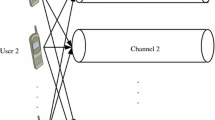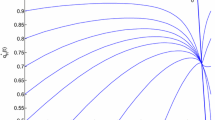Abstract
This paper considers a random access system with several users and one shared medium. Each user has its own queue (of packets) which can be empty or not. We propose an evolving coalitional game between the users and analyze the system outcomes. Unlike classical coalitional approaches that assume that coalitional structures are fixed and formed cost-free, we explain how coalitions can be formed in a fully distributed manner using evolutionary dynamics and coalitional combined fully distributed payoff and strategy (CODIPAS) learning. We introduce the concept of evolutionarily stable coalitional structure (ESCS), which, when it is formed, is resilient to small perturbation of strategies. We show that (1) the formation and the stability of coalitions depend mainly on the cost of making a coalition compared to the benefit of cooperation, (2) the grand coalition can be unstable and a localized coalitional structure is formed as an evolutionarily stable coalitional structure. When the core is empty, the coalitional CODIPAS scheme selects one element of the stable set. Finally, we discuss the convergence and complexity of the proposed coalitional learning in access control with different users’ activities. Some extensions to cognitive medium access control with queue management are provided.

















Similar content being viewed by others
Notes
Note that one can use a proportional split of the surplus instead of equal split, i.e., \(\alpha \) fraction of the surplus goes to user 1 and \((1-\alpha ) \) fraction to user 2 for some \(\alpha \in (0,1).\)
We do not consider an infinite population of users nor pairwise interactions.
We are not aware of the convergence time of a learning procedure in the context of games in coalitional form (such as the classical split-and-merge procedure) in dynamical network formation.
References
Abramson, N. (1970). The aloha system: another alternative for computer communications. Proceedings of the 17–19 Nov 1970, (pp. 281–285). Fall joint computer conference.
Aumann, R., & Drèze, J. (1974). Cooperative games with coalition structures. International Journal of Game Theory, 3, 217–237.
Benaim, M. (1999). Dynamics of stochastic approximation algorithms. In Seminaire de Probabilites, XXXIII. Lecture Notes in Math. 1709, (pp. 1–68). Springer: Berlin.
Benaim, M. (1996). A dynamical system approach to stochastic approximations. SIAM Journal on Control and Optimization, 34, 437–472.
Chelli, A., Tembine, H., & Alouini, M.-S. (2014). A coalition formation game for transmitter cooperation in OFDMA uplink communications. In Proceedings of IEEE Global Communications Conference, GLOBECOM (pp. 4197–4202), TX, USA, 8–12 Dec 2014.
Cisse, A.K., & Tembine, H. (2014). Cooperative mean-field type games. 19th World Congress of the International Federation of Automatic Control (IFAC), Cape Town, South Africa, 24–29 Aug 2014.
Douik A., Sorour, S., Tembine, H., Alouini, M.-S., & Al-Naffouri, T. Y. (2014). A game theoretic approach to minimize the completion time of network coded cooperative data exchange. In Proceedings of IEEE Global Communications Conference, GLOBECOM (pp. 583–1589), TX, USA, 8–12 Dec 2014.
Drechsel, J., & Kimms, A. (2010). The subcoalition-perfect core of cooperative games. Annals of Operations Research, 181, 591–601.
Edgeworth, F.Y. (1881). Mathematical psychics. Kegan Paul Publishers, London, reprinted in 2003, P. Newman (ed.): F. Y. Edgeworth’s Mathematical Psychics and Further Papers on Political Economy. Oxford University Press.
Gharehshiran, O.N., & Krishnamurthy, V. (2009). Dynamic coalition formation for efficient sleep time allocation in wireless sensor networks using cooperative game theory. 12th International Conference on Information Fusion Seattle, WA, USA, 6–9 July 2009.
Gillies, D. (1953). Some theorems on n-person games. Ph.D. thesis. Department of Mathematics, Princeton University.
Gillies, D. B. (1959). Solutions to general non-zero-sum games. In A. W. Tucker & R. D. Luce (Eds.), Contributions to the Theory of Games IV (pp. 47–85). Princeton: Princeton University Press.
Khan, Z., Glisic, S., DaSilva, L. A., & Lehtomaki, J. (2011). Modeling the dynamics of coalition formation games for cooperative spectrum sharing in an interference channel. IEEE Transactions on Computational Intelligence and AI in Games, 3(1), 17–30.
Khan, M., Tembine, H., & Vasilakos, A. (2012). Evolutionary coalitional games: Design and challenges in wireless networks. IEEE Wireless Communications Magazine, 19(2), 50–56.
Klusch, M., & Gerber, A. (2002). Dynamic coalition formation among rational agents. IEEE Intelligent Systems, 17, 42–47.
Liu, K. R. (2011). Cognitive radio games. IEEE Spectrum, 48(4), 40–56.
Luo, X., & Tembine, H. (2013). Evolutionary coalitional games for random access control. In Proceedings of the IEEE INFOCOM (pp. 535–539), Turin, Italy, 14–19 April 2013.
Nedic, A., & Bauso, D. (2011). Constrained consensus for bargaining in dynamic coalitional tu games. In Proceedings of the 50th IEEE Conference on Decision and Control and European Control Conference, CDC-ECC (pp. 229–234), FL, USA, 12–15 Dec 2011.
Roth, A., & Erev, I. (1995). Learning in extensive form games: Experimental data and simple dynamic models in the intermediate term. Games and Economic Behavior, 8(1), 164–212.
Saad, W., Han, Z., Debbah, M., & HjOrungnes, A. (2008). A distributed merge and split algorithm for fair cooperation in wireless networks. ICC Workshops 2008 IEEE International Conference on Communications Workshops (pp. 311–315).
Saad, W., Han, Z., Debbah, M., & Hjorungnes, A. (2009). A distributed coalition formation framework for fair user cooperation in wireless networks. IEEE Transactions on Wireless Communications, 8(9), 4580–4593.
Shannon, C.E. (1961). Two-way communication channels. In Proceedings 4th Berkeley Symposium Mathematical Satistics Probability (Vol. 1, pp. 611–644).
Shapley, L.S. (1952). Notes on the n-person game iii: Some variants of the von-neumann-morgenstern denition of solution. The Rand Corporation RM-817.
Taylor, P. D., & Jonker, L. (1978). Evolutionarily stable strategies and game dynamics. Mathematical Biosciences, 40(1–2), 145–156.
Tembine, H. (2014). Fast distributed strategic learning for global optima in queueing access games. 19th World Congress of the International Federation of Automatic Control (IFAC), Cape Town, South Africa, 24–29 Aug 2014.
Tembine, H. (2014). Nonasymptotic mean-field games. 19th World Congress of the International Federation of Automatic Control (IFAC), Cape Town, South Africa, 24–29 Aug 2014.
Tembine, H., Tempone, R., & Vilanova, P. (2013). Mean-field learning for satisfactory solutions. In proceedings of the 52nd IEEE Conference on Decision and Control (pp. 4871–4876).
Tembine, H. (2012). Distributed strategic learning for wireless engineers. Boca Raton: CRC Press.
Tohmé, F., & Sandholm, T. (1999). Coalition formation processes with belief revision among bounded rational self-interested agents. Journal of Logic and Computation, 9(6), 793–815.
Von Neumann, J., & Morgenstern, O. (1944). Theory of games and economic behavior. Princeton:Princeton University Press; 2nd edn. 1947; 3rd edn. 1953.
Acknowledgments
This work is partially supported by the NYU Global Seed Grants for Collaborative Research program. We would like to thank the Editor and three anonymous reviewers for their constructive comments, which helped us to improve the manuscript. This work has been started when the authors were with Ecole Superieure d’Electricite, Supelec, France. Part of this work was the Master Thesis of Miss Xin Luo under the supervision of Hamidou Tembine. We are grateful to the conference participants at ASMTA 2012 Analytical and Stochastic Modelling Techniques and Applications for their valuable comments and suggestions on the preliminary version of the present work. Short version of this work appeared in the proceedings of INFOCOM 2013, Torino, Italy, Luo and Tembine (2013).
Author information
Authors and Affiliations
Corresponding author
Rights and permissions
About this article
Cite this article
Luo, X., Tembine, H. Evolutionary coalitional games for random access control. Ann Oper Res (2016). https://doi.org/10.1007/s10479-016-2198-0
Published:
DOI: https://doi.org/10.1007/s10479-016-2198-0




